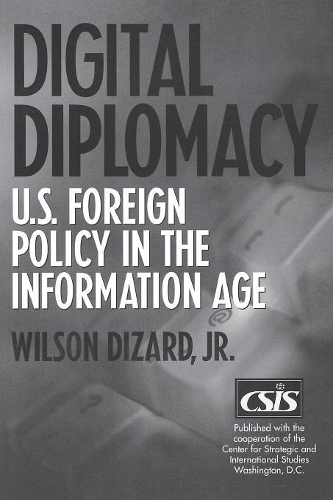
Digital Diplomacy: U.S. Foreign Policy in the Information Age
(Paperback)
Available Formats
Publishing Details
Digital Diplomacy: U.S. Foreign Policy in the Information Age
By (Author) Wilson Dizard Jr.
Bloomsbury Publishing PLC
Praeger Publishers Inc
30th April 2001
United States
Classifications
Tertiary Education
Non Fiction
Comparative law
International relations
384
Physical Properties
Paperback
232
Width 156mm, Height 235mm
340g
Description
Digital Diplomacy provides a comprehensive overview of the major milestones in United States international communications and information policy, from the early days of the Morse telegraph to the current Internet explosion. The book underlines the growing importance of the communications issues, particularly as they affect American leadership in a rapidly changing information environment. Dizard, a former foreign service officer, rejects the idea of a computer-based telediplomacy, arguing instead that the new technologies should be used primarily to strengthen the capabilities of American diplomats in dealing with information-age issues. A must read for those interested in the future of United States foreign policy, and a stimulating overview for scholars, researchers, and students involved in the subject.
Reviews
"Does a superb job of laying out the nuances and trajectories of digital diplomacy and shows in a very accessible style why the issues is so important. This book should be required reading for everyone entering the Foreign Service in the 21st century."-James Schwoch Associate Professor of Communication Studies Northwestern University
"Wilson Dizard has done it again. As with his earlier work, Digital Diplomacy positions Dizard at the cutting edge of those writing about media, information technology, and diplomacy. This will become and indispensable book for professional diplomatic communicators and for the classroom."-Steven Livingston Associate Professor and Director, Political Communications Program The George Washington University
.,."a timely exploration of the impact of the information/technology revolution on US foreign policy. the book fills a gap in the literature on the information revolution and foreign policy....Recommended for upper-division undergraduates and above."-Choice
...a timely exploration of the impact of the information/technology revolution on US foreign policy. the book fills a gap in the literature on the information revolution and foreign policy....Recommended for upper-division undergraduates and above.-Choice
An informative book on what the information age means for banalaties about a world in which knowledge crosses frontiers. Dizard rolls up his sleeves and explains the practical issues involved.-Foreign Affairs
This interesting volume considers issues that are rarely addressed in the study of United States foreign policy: it focuses on how information technologies, from the telegraph to the internet, have affected both the substance of United States foreign policy and the manner in which such policy is formulated. This is a book worth reading.-International Journal
..."a timely exploration of the impact of the information/technology revolution on US foreign policy. the book fills a gap in the literature on the information revolution and foreign policy....Recommended for upper-division undergraduates and above."-Choice
"An informative book on what the information age means for banalaties about a world in which knowledge crosses frontiers. Dizard rolls up his sleeves and explains the practical issues involved."-Foreign Affairs
"This interesting volume considers issues that are rarely addressed in the study of United States foreign policy: it focuses on how information technologies, from the telegraph to the internet, have affected both the substance of United States foreign policy and the manner in which such policy is formulated. This is a book worth reading."-International Journal
Author Bio
WILSON DIZARD, JR., is a Senior Associate in the international communications program at the Center for Strategic and International Studies in Washington. He is the author of six earlier books on media and communications.
